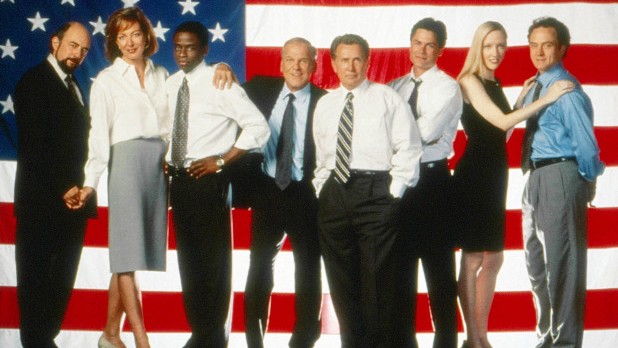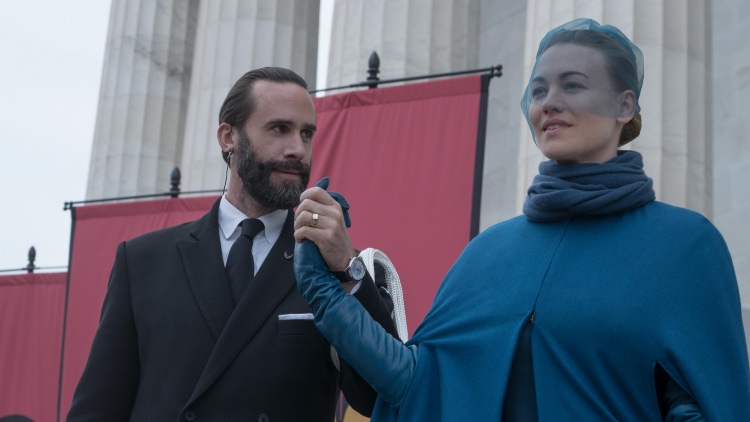If you’re like me — and let’s be honest, this seems highly unlikely — you do things like pour over new Emmy nominations for patterns and absurdities. This is just one of my particular eccentricities, but I find it more engaging and fun to do than with the Oscars, as there are just so many more categories. Like, dozens more. You can fit the entire list of Oscar nominees in a given year on a page or two. The Emmys? That’s like a booklet.
Not a pamphlet, mind you, an actual booklet.

So something like a bunch of actors from a single show crammed into a single category tends to stick out to me. For instance, four men from Ted Lasso were nominated for Best Supporting Actor in a Comedy Series. Four of them. That’s not a typo or misprint. Half of the eight nominees are from one show — Nick Mohammed, Jeremy Swift, Brendan Hunt, and Brett Goldstein. I thought this had to be some kind of record, but then noticed that four actresses from The Handmaid’s Tale were honored with nods for Best Supporting Actress in a Drama Series — Madeline Brewer, Anne Dowd, Yvonne Strahovski, and Samira Wiley. That’s half of those nominees, too.
Ah, but it doesn’t end there. Three of the remaining four nominees come from one other show, The Crown — Emerald Fennell (fresh off her Oscar for writing Promising Young Woman), Gillian Anderson, and Helena Bonham Carter. That’s seven of eight nominees in a single category from just two shows (in case you were wondering, the eighth and final nominee, Aunjanue Ellis, hails from the late and lamented Lovecraft Country).
Also, it should be noted that, of the remaining four nominees in the Supporting Actor in a Comedy Series, two are from Saturday Night Live, Bowen Yang and Keenan Thompson. If anything, this only plays into the theme here.

The packing of categories is not new. On the contrary, it’s been going on for decades. Not so long ago, the Supporting Actor in a Drama Series was owned by the cast of The West Wing, with first Richard Schiff, then Bradley Whitford, then the late John Spencer all winning in succession for the show’s first three seasons, and Alan Alda winning several years later for the final one. There’s actually a fun story attached to that. Schiff beat out Spencer in the show’s first season, and when Whitford beat them both in Season Two — he turned to Spencer after his name was called and said, “Next year, it’s you.”
And it was.
This phenomenon, multiple actors from a single show being nominated in a category has always been a thing, and is not isolated to the acting categories, either. A single show can be nominated multiple times in any category, and often is (Hacks, just to name one example, has three Editing nominations this year, and both Mad Men and Seinfeld, to name two randomly chosen programs, regularly had numerous writing nominations in a given year). The question is, should it be?
I like to sometimes compare the Oscars to the Emmys in this space, primarily because they often tend to be an apples to apples contrast. That’s not really the case here, though, because while more than one actor from a single movie can be nominated for an award — and sometimes is — no other category allows for it. There is, after all, just one movie, whereas there are many episodes of any TV show. Also, it should be noted, the occurrence is not nearly as common on the film side as it is on TV, so it’s not necessarily a good measure.
Which means that this thing is very specifically a TV issue. To some, it’s rather an irritating one, too. As my editor Ed pointed out last week when we were discussing this subject, “I mean, supporting actress drama and some of the guest categories are ridiculous! At some point, the nomination should just go to ‘Every guest actor who appeared on the show we like.’”

In Ed’s mind, this is bad for TV and bad for the awards. His thinking is that each show should be able to nominate one actor per category, and one episode for the others, so that no single show could monopolize any given set of nominations. On the surface, this is not an unreasonable notion, other than that it guarantees that no one will ever surpass Game of Thrones as the most recognized show in Emmys history. That alone should preclude it from happening, since GOT is the most overhyped, overrated show ever. (Yeah, yeah, the first three seasons were good, but even they were overblown. And after a steady downward slide, with some random highlights mixed in, it fell off a cliff there at the end. Sure, Dinklage was terrific, but that’s not enough to save it all. Come at me all you like, doesn’t make me wrong.)
All that aside, it actually does make a modicum of sense. It also spreads the wealth and honors more shows. If a series can only submit one actor per category, that means more actors from more shows are recognized.
But, and you knew this was coming, is that the right thing to do? Does that preclude the best people from being recognized? Obviously, the best from a single show would make the list, but what if three others are just better than anyone else on any other show? Should an actor, or writer, director, editors, pick-the-artisan-of-your-choice be penalized, because they’re on a great show that features a lot of top-notch talent? If a show is that much better than anything else — and, again, that does happen from time to time — why shouldn’t it reap the rewards and get the lion’s share of nominations and/or awards? Does Jonathan Banks, to use just a single example, get penalized and not nominated for Breaking Bad because he’s on the same show as Aaron Paul?
On the one hand, I see Ed’s side of this, and The West Wing’s revolving winners sort of backs it up. Schiff won, so the next year maybe the show puts forth Whitford, followed by Spencer. Easy. But actors do different work in different seasons of a show, especially as characters evolve and develop, and a good performance one year might turn into a great one the next. If only a single actor, to use just one category, was eligible per show, that’s potentially a ton of great work that must go unrecognized.
On the other, though, I tend to err on the side of excellence and the idea of a meritocracy. It might get me fired, but I happen to believe that if you’re one of the best, you should be recognized, regardless of where you’re situated. That is, after all, what these kinds of awards are all about.
 Neil Turitz is a journalist, essayist, author, and filmmaker who has worked in and written about Hollywood for nearly 25 years, though he has never lived there. These days, he splits his time between New York City and the Berkshires. He’s not on Twitter, but you can find him on Instagram @6wordreviews.
Neil Turitz is a journalist, essayist, author, and filmmaker who has worked in and written about Hollywood for nearly 25 years, though he has never lived there. These days, he splits his time between New York City and the Berkshires. He’s not on Twitter, but you can find him on Instagram @6wordreviews.
You can read a new installation of The Accidental Turitz every Wednesday, and all previous columns can be found here.





